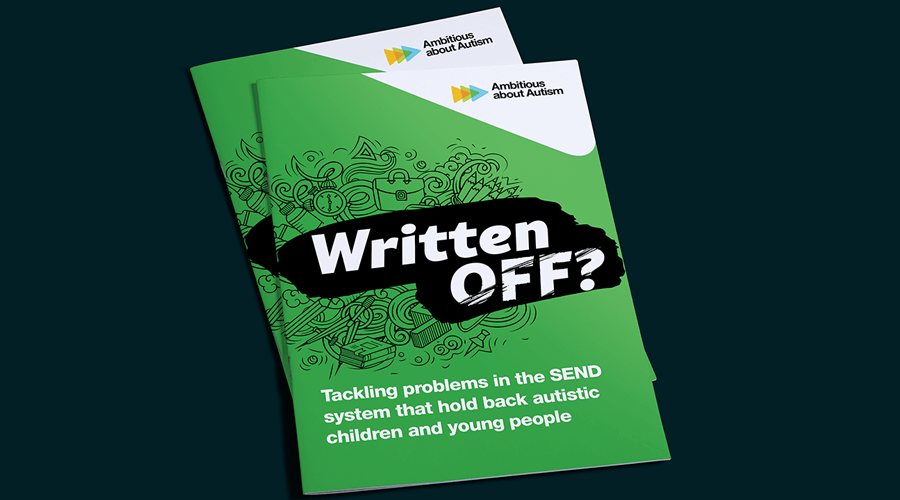Ofsted’s 2021/2022 annual report
Last week, Ofsted released its annual report which is presented to the government by the education regulator’s Chief Inspector. The report examines several key areas including SEND, the quality of schools, early years, further education and social care and outlines the issues within them.
This year’s report highlighted significant weaknesses within the SEND system such as delays to Education Health and Care plans, issues with workforce and attendance.
Last month, we launched our Written Off? campaign calling on the government not to write off autistic children and young people’s chances of achieving in education.
We spoke to nearly 2,000 families and autistic young people, who told us about the issues they have faced with the SEND system – many of these were reflected in Ofsted’s annual report.
We’re calling on the government to:
- Uphold current laws that help children with SEND get the assessments, support, and school place they need, and protect their funding, to avoid making things worse and causing active harm to children and families.
More needs to be done to uphold current laws. There are statutory limits in place to ensure that Education, Health and Care (EHC) plans are issued within 20 weeks. Yet Ofsted’s report revealed that in 2021, only 60% of EHC plans were issued within this time frame.
The report highlights that delays in assessing children and young people for EHC plans is a persistent problem, with delays caused by “rising demand, staff absences and recruitment issues.” It also said that these delays are “particularly severe for certain types of need, such as autism.”
Since the 2014/15 academic year, the number of children and young people with EHC plans and/or requiring SEN support has increased by 51% and 6% respectively. Ofsted’s report revealed that in areas where a focus was placed on processing EHC plans more quickly, it was done so at the expense of quality and had an impact on the efficiency of updating or amending existing plans.
It is not just assessments where rights are not being upheld. As in previous years, Ofsted’s figures show that exclusion and suspension rates are higher for pupils with SEND. It also says that the pandemic has obscured trends in off-rolling (the process of removing children from a school roll without the due process of a formal exclusion) which means it is harder to tell if this is an issue. However, it goes on to state that there is anecdotal evidence to suggest that “part-time timetables are being used more regularly in schools. This is where children attend school, but their attendance is limited to a handful of lessons. This might be held up as an alternative to exclusion, but it is another avenue by which children can slowly slide out of education.”
Ofsted’s report states that “across each of the Department for Education’s core attendance measures, the attendance of pupils with SEND has deteriorated since 2019, and had not yet returned to pre-pandemic levels by the autumn of 2021.”
- Make all education policy work for SEND pupils so they can achieve their potential, with a clear expectation that every school is a SEND school, every teacher is a SEND teacher, and every policy is a SEND policy.
The Ofsted report reflected on how “children with the most complex needs are often the least well served in already overstretched systems.” This is why it is vital that every education policy needs to work for SEND pupils, to ensure they do not slip through the gaps or get written off before they have even left school.
One of the biggest factors in determining how well an autistic child succeeds and makes progress at school is how well their autism is understood by their teachers. Our own research found that 95% of autistic children and young people felt that teachers need specific training on autism and 73% felt that their teachers did not understand their needs. Ofsted’s report highlights the importance of understanding that “even when they share a diagnosed need, children and young people with SEND are not a homogenous group and cannot be treated as such.”
- Publish a plan to develop a valued, skilled, sufficient SEND workforce, backed by resources, with clear timescales.
Now, more than ever, a workforce plan is needed. Ofsted’s examinations found that “staff turnover and absence were challenges for leaders of special schools. In some special (and mainstream) schools, recruiting staff with SEND expertise had been difficult and staff turnover had been higher than pre-pandemic. This had a negative impact on pupils, especially when new staff were not familiar with pupils’ individual needs or when certain provision required two members of staff […] More broadly, staff absence may result in non-specialist teaching, as lessons are covered by supply teachers or non-specialist staff. This may affect the quality of education.”
- Ask Ofsted to make the quality of SEND support a greater priority in inspections.
Ofsted’s findings demonstrate the need for greater accountability within the system, which is why we are also calling on the education regulator to further prioritise SEND in its inspection framework, making the quality of SEND support a limiting judgement.
- Gather and share evidence on how mainstream education and special schools and colleges can work together to get children the right support, at the right time, in the right place.
We want autistic children and young people to have better access to specialist support if they need it, in whatever school they attend. The Ofsted report stated that “there is a widespread recognition that effective mainstream education – particularly getting a good foundation early on – is integral to an effective SEND system.”
If the government sets a clear vision for increased collaboration between mainstream and specialist education providers, this not only helps meet children’s individual needs sooner and with less disruption, but also helps build capacity and share learning between staff.
We agree with Ofsted’s conclusion on SEND that “wholesale change is needed to make sure thousands of, often vulnerable, children get the high-quality education they need and deserve.”
Find out more about our Written Off? campaign.
About the author
Mariam is the Policy and Campaigns Manager at Ambitious about Autism.












